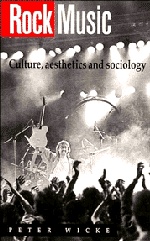Book contents
- Frontmatter
- Contents
- About the author
- Preface
- 1 ‘Roll Over Beethoven’: new experiences in art
- 2 ‘Rock Around the Clock’: emergence
- 3 ‘Love Me Do’: the aesthetics of sensuousness
- 4 ‘My Generation’: rock music and sub-cultures
- 5 ‘Revolution’: the ideology of rock
- 6 ‘We're Only in It for the Money’: the rock business
- 7 ‘Anarchy in the UK’: the punk rebellion
- 8 ‘Wild Boys’: the aesthetic of the synthetic
- 9 Postscript: ‘The Times They Are A-Changing’
- Notes
- Bibliography
- Discography
- Index of people and groups
- General index
5 - ‘Revolution’: the ideology of rock
Published online by Cambridge University Press: 01 June 2011
- Frontmatter
- Contents
- About the author
- Preface
- 1 ‘Roll Over Beethoven’: new experiences in art
- 2 ‘Rock Around the Clock’: emergence
- 3 ‘Love Me Do’: the aesthetics of sensuousness
- 4 ‘My Generation’: rock music and sub-cultures
- 5 ‘Revolution’: the ideology of rock
- 6 ‘We're Only in It for the Money’: the rock business
- 7 ‘Anarchy in the UK’: the punk rebellion
- 8 ‘Wild Boys’: the aesthetic of the synthetic
- 9 Postscript: ‘The Times They Are A-Changing’
- Notes
- Bibliography
- Discography
- Index of people and groups
- General index
Summary
One of the myths about rock music is that it arises spontaneously out of the common experience of musicians and fans. Rock music is, in fact, an industrial product and therefore in the first instance follows the conceptions which both musicians and producers have of their audience and their own activities, of the demands and possibilities of music and of the relationship between rock music and society. The fact that, as part of this process, musicians always attempt to match the thoughts and feelings, the patterns of value and cultural meaning of music of their fans, that they want and need to be successful, does not mean that they merely become an instrument for fulfilling the wishes of their audience. It is more the case that they react completely independently and consciously to the demands of their audience, the more so in fact because most musicians have a completely different social background from that of their working-class fans. Most rock musicians come from the petit bourgeois middle classes and have never experienced the everyday life of working-class teenagers. And even those musicians who have personal experience of this way of life live, as musicians, in a world characterised not always by wealth and luxury but certainly by freedom from the routine, the uniformity and the constraints of working in a factory or going to school.
- Type
- Chapter
- Information
- Rock MusicCulture, Aesthetics and Sociology, pp. 91 - 113Publisher: Cambridge University PressPrint publication year: 1990



